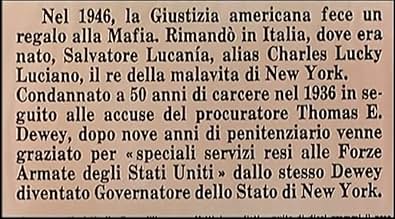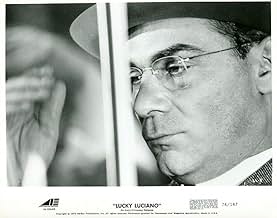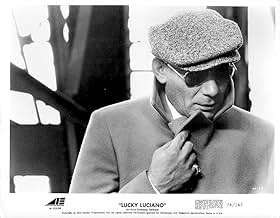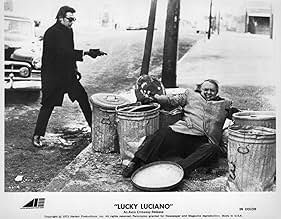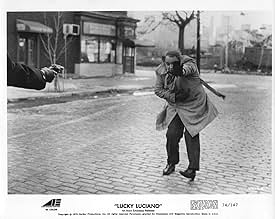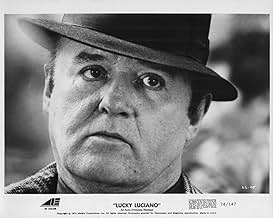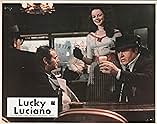IMDb RATING
6.4/10
1.7K
YOUR RATING
Biopic of Mafia boss Lucky Luciano, covering his life from 1946 to 1962 with occasional flashbacks.Biopic of Mafia boss Lucky Luciano, covering his life from 1946 to 1962 with occasional flashbacks.Biopic of Mafia boss Lucky Luciano, covering his life from 1946 to 1962 with occasional flashbacks.
- Awards
- 2 wins & 2 nominations total
Edmond O'Brien
- Commissioner Harry J. Anslinger
- (as Edmund O'Brien)
Featured reviews
Francesco Rosi's film is a very fine and unglamorous treatment of the most famous mafioso of the 20th Century. Filmed in a quasi-documentary style, with un-enhanced sound recorded directly in real-life settings, we constantly have the feeling that we are watching real characters and not actors, even if one of the greats, Gian Maria Volontè, plays Luciano. And apparently many of the cast are indeed non-actors, and a few are even playing themselves. The movie is genuinely refreshing in that it does not romanticize or glorify or gloss over Luciano or the gangster's life. Early on it shows extremely violent scenes that condense a tremendous amount of background story into just what we need to know about Luciano's rise to preeminence in the underworld. And it's a great hook to start the film when the gangster's famous American life is ending. It's definitely a film for thoughtful adults, no cartoonish tidbits that would appeal to adolescents.
In this country, Lucky Luciano is one of those 20s legends who have so often been glamorized in movies; we tend to be fascinated by such characters, and although films tend to either explicitly condemn them or show them coming to bad ends, they are among the most infallibly popular Hollywood staples. We also would concentrate on Luciano's years in America, which could be a familiar plot of the rise and fall of a gang boss. But Rosi's film begins with him leaving this country; it relates the long career that he had in Italy, in the drug trade, a time that Americans know little of -- it doesn't form part of the legend. Most of all, Rosi deliberately downplays the glamor. The drug trade is big business, and this middle-aged Luciano is a very solid businessman; the director (and the actor) have undercut the expected charisma. The efforts of police and government against him are portrayed as "factually" as possible (which makes aspects of their discussions rather unintelligible to Americans). Of course, all these things will make the movie seem rather boring to many viewers here! If you're looking for gangster thrills, go elsewhere; this is a movie of ideas, a critique directed at Italy in particular.
If you want to watch Gian Maria, the greatest actor of all time, at his best, watch him in "Investigation of a Citizen Above Suspicion", "Le Cercle Rouge", "For a Few Dollars More" or "I Am Afraid", he worked much much better with Petri, Melville, Leone and Damiani. This one is very boring and Volontè doesn't appear much. And when he appears, he has the same face that does not say too much. This role did not quite fit him. Rosi's films, most of them, are a special genre, very close to the documentary, very hard to follow, you got to have a patience of steel...
Reading some of the other reviews of Rossi's Lucky Luciano it is worth remembering that before it's release in 1974 the Italian film censors got their hands on Rossi's final cut and butchered it against his wishes, his protestations falling on deaf ears. It would appear this is the only cut that has survived official interference and, why I suspect it is so disjointed in its chronology. It is with this unwarranted and suspicious interference from the Italian censor that we should view this movie and which makes the content so much more revealing about the Italian state and how it's hidden hand works on different levels.
This is a very powerful and sophisticated film so both character and historical background knowledge is essential before viewing to make this a much more rewarding experience. Rossi is a master of political expose in cinema and deserves credit to agree releasing it in this pared down version - which must have stuck in his throat to do so at 100/110 minutes according to which distributors copy you buy -
This is a very powerful and sophisticated film so both character and historical background knowledge is essential before viewing to make this a much more rewarding experience. Rossi is a master of political expose in cinema and deserves credit to agree releasing it in this pared down version - which must have stuck in his throat to do so at 100/110 minutes according to which distributors copy you buy -
A sort of biography of Lucky Luciano the Italian mobster who was deported to Italy by USA's government after years in the jail, directed by the fine Francesco Rosi, the movie starts in this point when Lucky Luciano (Gian Maria Volonté) has been headed toward to Sicily at Italy by boat, mixed with few flashbacks concerning his violence background, he established at Sicily his homeland and Naples, where he manages all drug smuggling targeted to Europe and America, at its time post war the whole Italy was occupied by USA's Army and all major positions were chosen by American authorities, suggesting some agreement with local corrupts practices, upon this establishment the smooth Luciano feels free to work hidden over the shadows and becoming untouchable, however the unrelenting traffic ongoing peeves the American justice, sending to Italy an inspector to catch Lucky Luciano, the casting is the highlight of the slow paced picture, Gian Maria Volonté simply is great as Lucky, the almost unknowable Edmund O'Brien as Commissioner Anslinger also Rod Steiger as akind cheap mobster and Vincent Gardenia as the corrupt Colonel Charles Poletti, but don't expect too much, has many striking flaws strangely allowed by Rosi as portraits a modern New York as if it was on 1946, I'm trying wondering how it should happened over so magnificent director!!!
Resume:
First watch: 2020 / How many: 1 / Source: DVD / Rating: 7
Resume:
First watch: 2020 / How many: 1 / Source: DVD / Rating: 7
Did you know
- TriviaIn Senses of Cinema's translation of an interview with film critic Michel Ciment for 'Le Dossier Rosi' (1976), director Francesco Rosi said of Charles Siragusa's war against Lucky Luciano: "He feels like the victim of a conspiracy he can't quite comprehend . . . that someone or something is stopping him from carrying out his work the way he wants to".
- GoofsWhen Lucky Luciano is deported in the mid-Forties, far more modern buildings can be seen on the New York skyline.
- ConnectionsFeatured in Neapolitan Diary (1992)
- How long is Lucky Luciano?Powered by Alexa
Details
Contribute to this page
Suggest an edit or add missing content

